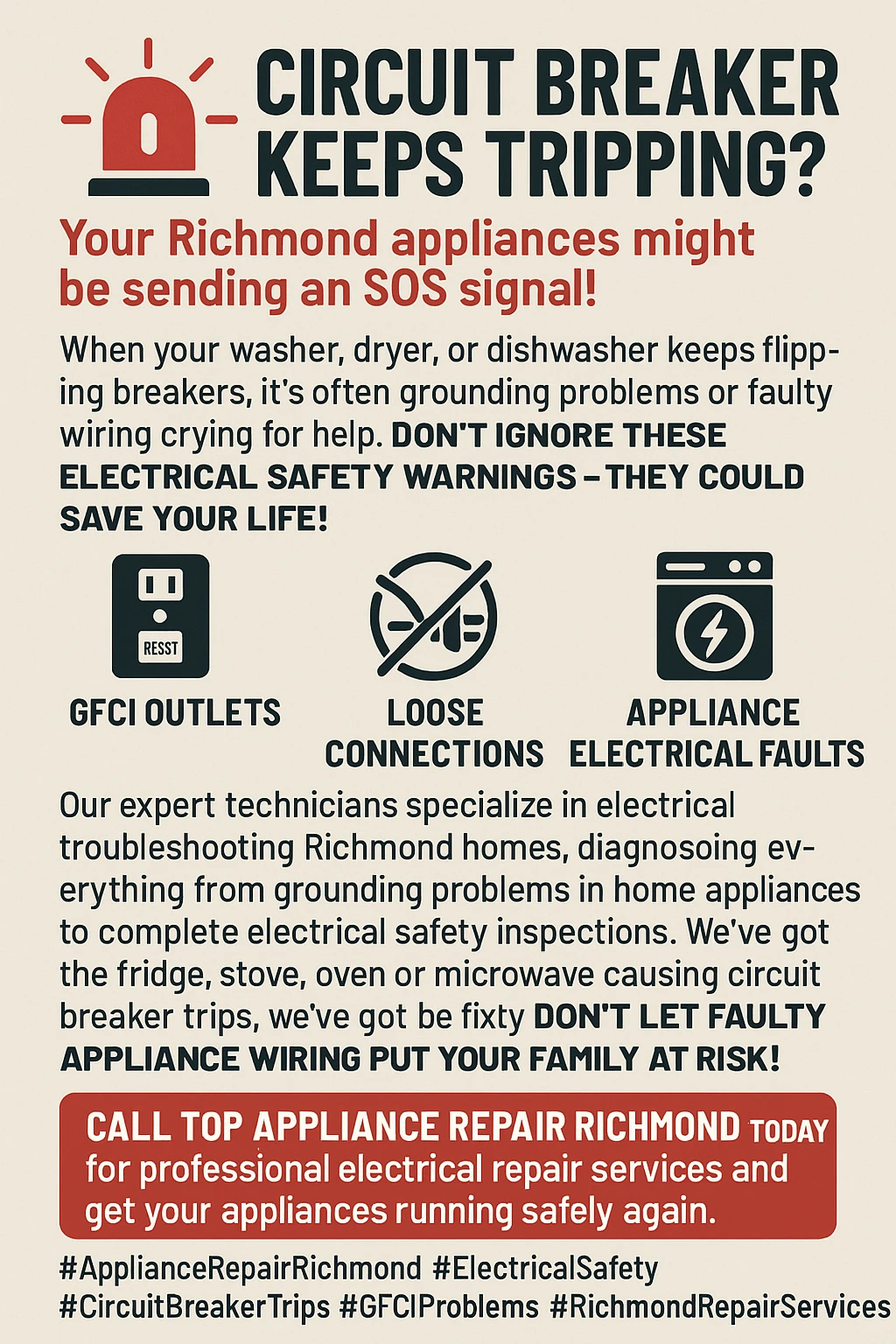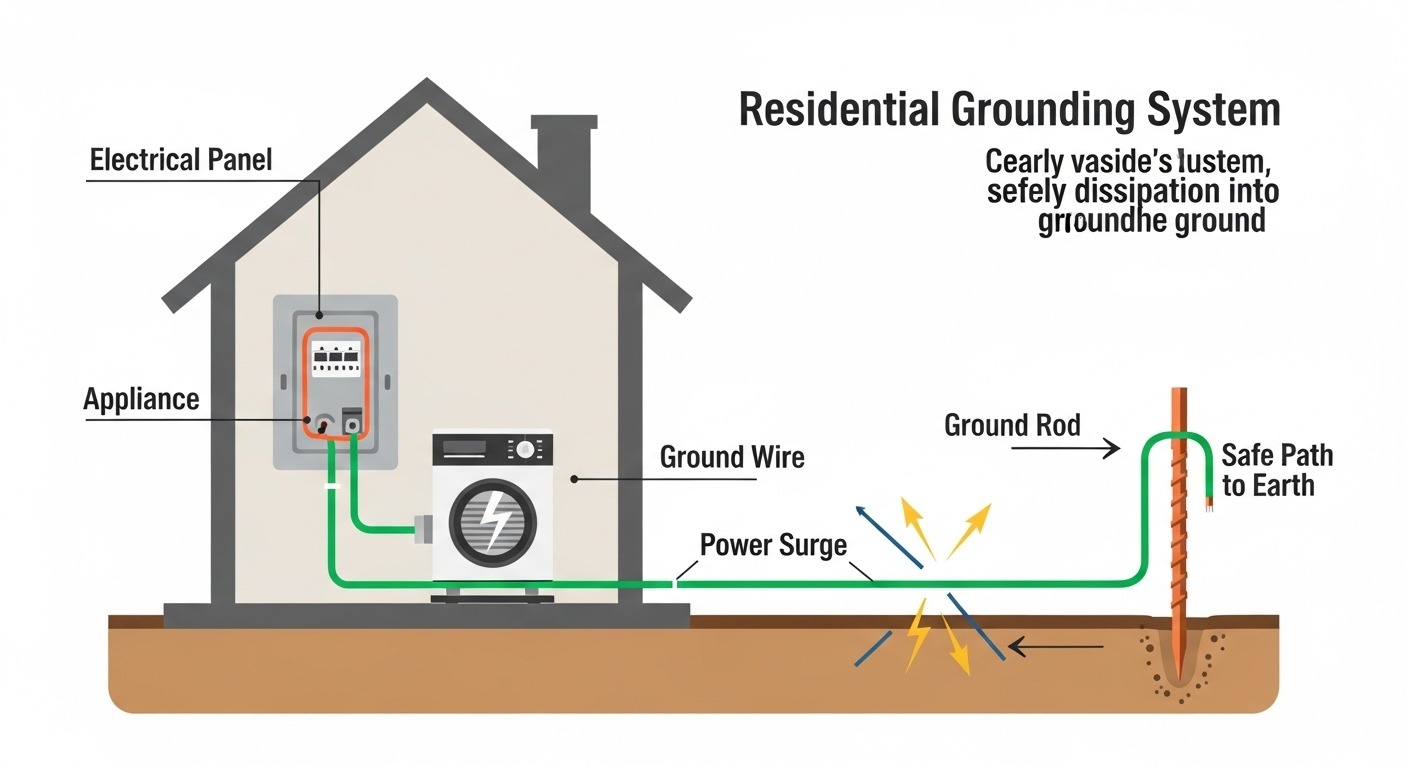Richmond Appliance Grounding Issues: Why Your Appliances Keep Tripping Breakers (And the Electrical Safety Fixes That Could Save Your Life)
Dealing with appliances that keep tripping your circuit breakers? Before you blame the microwave or assume you need a costly electrical panel upgrade, the real culprit might be lurking in your home’s grounding system—a hidden safety issue that could literally save your life if addressed properly.
Picture this: you’re making your morning coffee when suddenly the kitchen goes dark. Again. You trudge to the basement, flip the breaker, and wonder why this keeps happening. Sound familiar? If you’re a Richmond homeowner dealing with constantly tripping breakers, you’re not alone—and more importantly, you might be dealing with something way more serious than an overloaded circuit.
[IMAGE PLACEHOLDER FOR IMAGE1]
Here’s the thing that most people don’t realize: when appliances keep causing breaker trips, it’s often not the appliances themselves that are the problem. It’s your home’s grounding system silently failing, creating dangerous conditions that put your family at risk for electrical fires, equipment damage, and even electrocution. The scary part? Most Richmond homes built before the 1980s have grounding systems that were never designed to handle today’s electrical demands, and many are slowly deteriorating without homeowners ever knowing.
Think of electrical grounding as the safety net for your entire electrical system. When it’s working properly, excess electricity has a safe path straight into the earth, away from your appliances and your family. But when that safety net has holes in it—which happens more often than you’d think in our area’s older homes—electricity starts looking for alternative paths. And trust me, you don’t want to be that alternative path.
Key Outtakes:
- Hidden Grounding Problems: Poor grounding connections at ground rods or water pipes cause most appliance breaker trips, not appliance malfunctions—and these issues often stem from corroded connections that worsen over time in Richmond’s humid climate.
- GFCI Outlets Are Critical Safety Devices: Ground Fault Circuit Interrupters detect current leakage as low as 0.005 amps and instantly disconnect power, but they don’t replace the need for proper whole-home grounding systems.
- Warning Signs You Can’t Ignore: Mild shocks from appliances, flickering lights, buzzing sounds near outlets, and frequent breaker trips all signal potentially dangerous grounding failures that require immediate professional attention.
- Richmond-Specific Challenges: Many local homes lack proper water meter bonding jumpers and face accelerated grounding system deterioration due to our clay-heavy soil and high moisture levels.
- Professional Assessment Saves Lives: A comprehensive electrical inspection costs $150-$400 and can identify life-threatening grounding hazards before they cause fires, equipment damage, or injuries.

Understanding Electrical Grounding and Appliance Protection
Let’s start with the basics, because understanding how grounding works is like learning the rules of the road—it might seem boring, but it could literally save your life. Electrical grounding provides a safe pathway for excess electrical energy to dissipate into the earth, preventing dangerous voltage buildups in your home’s electrical system. The earth itself has essentially zero electrical potential—what electricians call “ground potential”—making it the perfect reference point for electrical systems.
Here’s how it actually works in your home: when voltage rises too high in one part of your electrical system (which can happen due to lightning strikes, power surges, or equipment malfunctions), the excess electrical energy flows through the grounding path into the earth, where it dissipates harmlessly. This is accomplished through copper wires that connect to water pipes or grounding rods driven deep into the soil, where moisture helps conduct electricity away from your home. It’s like having a pressure relief valve for your electrical system—when things get too intense, there’s a safe way for that energy to escape.

Now, here’s where it gets personal: your sensitive electronics are particularly vulnerable to problems caused by faulty grounding. When grounding isn’t working correctly, voltage spikes can travel through your electrical wiring and into devices like refrigerators, washing machines, and computers. These spikes might not cause immediate failure, but they often lead to gradual degradation of components, shortening the lifespan of expensive equipment. I’ve seen Richmond homeowners replace the same appliance multiple times, never realizing that the real problem was lurking in their electrical system’s foundation.
Circuit breakers play a crucial role in this safety dance. These devices are designed to protect electrical circuits from damage caused by overloading or short circuits, and when a circuit breaker trips, it interrupts the flow of electricity to prevent overheating and potential fires. But here’s the key connection most people miss: a properly grounded electrical system helps trip circuit breakers quickly during electrical faults. During electrical faults like short circuits, proper grounding helps trip your circuit breakers quickly, cutting power before dangerous situations develop.
The modern electrical code requirements have evolved significantly over the years. The National Electrical Code (NEC) sets the standards for safe electrical installation across the United States, including specific grounding requirements, and the NEC is revised every three years to ensure that codes take into account the latest in technology and safety. Current standards require ground rods to be at least 8 feet long and 3/8 inch in diameter, and when driving multiple rods, they must be spaced at least 6 feet apart to comply with NEC requirements.
Why Your Appliances Keep Tripping Breakers: The Grounding Connection
Now that we’ve covered the foundation, let’s dive into why your morning routine keeps getting interrupted by trips to the electrical panel. The relationship between grounding and breaker trips is more complex than most people realize, and understanding this connection can help you identify whether you’re dealing with a simple overload or a more serious safety issue.
One of the most frequent causes of a tripped circuit breaker is an overloaded circuit, which occurs when more electrical current flows through a circuit than it can handle. But here’s where grounding comes into play: when a circuit is properly grounded, excess current has a safe path to the earth. Without adequate grounding, that same excess current can create dangerous voltage spikes that damage appliances or create shock hazards.

Let me paint you a picture of how this plays out in real life. You’re in your kitchen, and you decide to run the microwave while the dishwasher is going and the coffee maker is brewing. Suddenly, the breaker trips. In a properly grounded system, this might be a simple case of too much demand on one circuit—annoying but not dangerous. However, if your grounding system is compromised, that overload situation becomes significantly more hazardous because there’s no safe path for excess electrical energy to escape.
Many older Richmond homes have small electrical panels designed for homes built 30-50 years ago. These panels may not be able to handle the power demands of today’s modern appliances, and when combined with deteriorating grounding systems, frequent breaker trips become inevitable. What starts as an inconvenience can quickly escalate into a safety emergency when proper grounding isn’t available to handle electrical faults.
Short circuits and ground faults represent the dangerous end of the spectrum. A short circuit occurs when a hot wire touches another hot wire or a neutral wire, causing a surge of electrical current that trips the breaker—and short circuits are dangerous because they can lead to electrical fires. Even scarier is a ground fault, which occurs when a hot wire comes into contact with a ground wire or a grounded part of your home, like a metal wall box or appliance housing.
When a ground fault happens, the GFCI outlet will detect even a small amount of current leakage as low as 0.005 amps and trip right away, disconnecting power. This instantaneous response is what prevents electrocution—without proper grounding and GFCI protection, that stray electrical current could flow through anyone touching the affected appliance.

